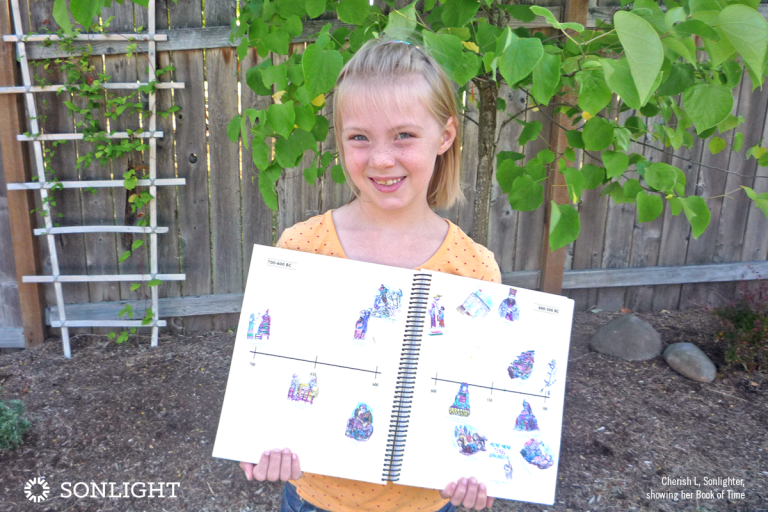Social Studies is a common core subject in schools. It is an easy subject to add to a lesson plan and teach when you have time, but I don't believe it is an effective way to learn. Discover why children need to study History rather than social studies.

When I was in school, we learned about the world in seemingly unrelated snippets. My teachers called the subject Social Studies.
- We might start the year studying Chinese culture.
- Then we'd study the Pilgrims because it was getting close to Thanksgiving.
- Then we'd take a break to study the Plains Indians and build miniature teepees.
Social Studies remains a core subject in many educational systems today. I think schools often do Social Studies because it's a unit that you can pop into your schedule when you have time. It's expedient. But I don't think it's a very effective way to learn.
I believe children need to study History rather than social studies. Why?
1. History provides the framework we need to make sense of our world.
With Social Studies, I never learned the big-picture of history and how the world works. But a history-based curriculum (like Sonlight) gives your children the framework of knowledge they need. As you move through time, you give them a cohesive map of knowledge they will build on their entire lives. As they learn new information, they place that knowledge in the appropriate place in their mental map. If you are using a timeline with your studies, that mental map becomes concrete.
2. History helps us understand other cultures.
In Social Studies, we might study cultural facts about a specific Chinese dynasty. But when we study the span of China's 3,000 years of recorded history, we get a much better sense of who they are. We see how Confucius, who lived around 500 BC, influenced Chinese culture at each point of their development. We see how his emphasis on honoring superiors still governs Chinese culture.
3. History helps us honor other cultures.
Sometimes we can think our culture is the only group who has done it right; we're the only ones who have it all figured out. But when we do that, we dishonor all the people who have lived before us and achieved great things. Think about it—in 3,000 years of recorded history, for example, the Chinese people have had some pretty remarkable achievements!
4. Studying history teaches discernment.
As we study history we read a variety of texts. You can't very well study it any other way. I believe that teaches us to discern right from wrong. It helps us learn not to swallow everything we read or see on TV. Consider the legacy of Franklin Delano Roosevelt (the President during the Great Depression and WWII). Many biographers paint a rosy picture of his work, whereas others present a more critical perspective. As students read and study history from different perspectives, they learn how to weigh different opinions and come to their own conclusions. In the case of FDR, they'll likely conclude that he made bad decisions in some areas, did some things OK, and did other things quite well. I don't think any other discipline teaches this discernment skill as well as history does.
5. History helps us make wise decisions.
Did you know that the pilgrims attempted socialism? As we study history, we see they created a common storehouse and asked everyone to bring the food in; they were going to share all things. These pilgrims all shared the same cultural background, worshiped in the same way, and believed in a common cause. But after one season, they decided that socialism didn't work. They discovered that if people didn't have rewards, they didn't work hard enough. As we study history, we can learn helpful lessons for our world today—we can learn from history.
6. History inspires us.
As you look at Sonlight's history selections, you'll see a lot of biographies. We do that on purpose. We want our kids to read about those who have just been ordinary people like them, and who went out and did amazing things. These historical figures can inspire us to think bigger thoughts, to be people of purpose, to be people who desire to make a difference. At Sonlight we regularly pray that our students will be people who stand up and say, "I want to make a difference in our world."
7. God values history.
This was a new thought for me recently. I believe God honors history. Think of the Bible: it's divided into 66 books, and many of them are direct history. They tell the story of what happened to specific people, in a specific place, at a specific time. And there's a lot of history in the other books as well.
God wants us to read this history and learn from it. So even God thinks history is something worth spending time thinking about and reasoning on. I've heard that the Bible (and, of course, the Torah) may be the only Holy Book that includes history. Just something to ruminate on!
So my challenge to homeschoolers is to skip the scattered Social Studies approach and instead study History. (Of course, since I believe this is so important, you can rest assured that Sonlight takes the History approach.) Let's learn from history—as history helps us live with wisdom and make sense of our world.








[…] Sonlight Core covers a certain period of history or area of the world. Sonlight's focus on history instead of social studies provides many practical benefits, but it also aids in combining students, covering content, and […]
According to the teachings I got from one of my church leaders, the Bible doesn't contain 66 books but 73 books of which are all filled with history as well.
The Catholic church includes 11 books in its canon that the Protestant religions do not.
[...] of the school system. History was little more than a series of titles and dates mixed in with social studies. It wasn't until the sixth grade that a teacher read a well-written story from history to him. In [...]
Bible isn't the only Holy book ,you just made a generalization here, Quran is also filled with history encompassing the past about the prophets and how they changed societies.
[...] we study other cultures and history, we can learn a good deal about ourselves. But I love reading perspectives on our culture from [...]
This helps explain why I never liked "social studies" as a kid, yet I love the history and geography my son and I are learning with Sonlight. And also why so much of it seems new to me; I'm sure I didn't learn very much of it as a kid, and what I did learn didn't "stick." We've just finished Sonlight's two-year intro to world history in Cores A & B and are about to embark on the two-year intro to American history in Cores C & D. I can't wait! Thank you so much.